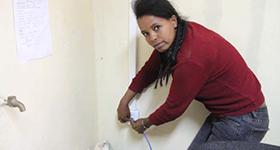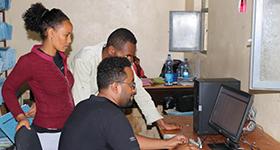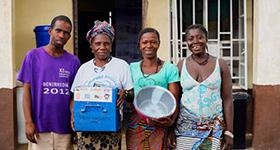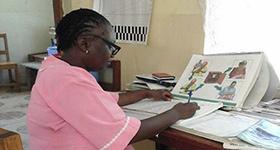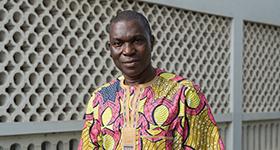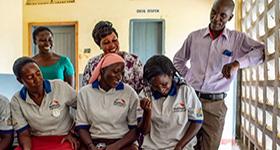Background
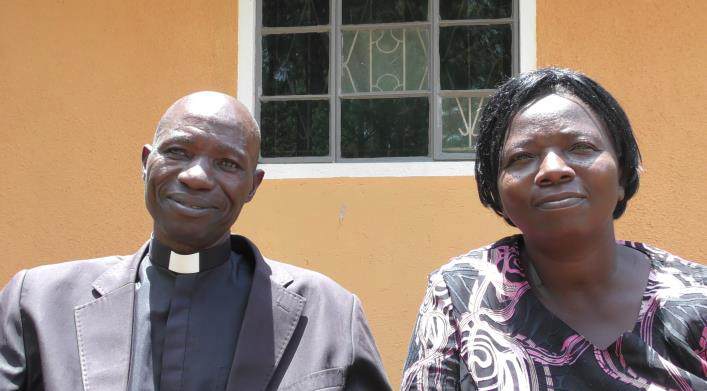
Reverend Charles Irongo and his wife, Mrs. Edith Irongo, talk to their community about family planning and use their family as an example of child spacing.
Reverend Charles Irongo and his wife Edith are happy to tell couples in their congregation how they used contraception to space their four children. The reverend, an Archdeacon at the Kyando Anglican Church of Uganda in southeastern Uganda, sees a clear connection between the church’s role in spiritual matters and health issues, like healthy timing and spacing of children. The church operates a health center that offers family planning care along with other health services. “The church provides family planning because we think about spiritual health and the health of the body,” Reverend Irongo explains. “They both are important to take care of the whole person.”
The Kyando health facility is in the rural diocese of Busoga and is one of four church-run health facilities that experienced an increase in family planning client visits after faith leaders at the affiliated churches were trained in family planning promotion. The Uganda Protestant Medical Bureau (UPMB) trained the faith leaders as part of a cooperative agreement funded by the United States Agency for International Development (USAID) through Advancing Partners and Communities (APC).
Women in Uganda suffer a high maternal mortality rate of 343 deaths per 100,000 live births, one of the highest rates in the world. Timing and spacing pregnancies for when they are healthiest for the mothers is one of the most important ways to protect maternal health.
Religious leaders are uniquely positioned to influence behavior and change harmful attitudes prohibiting family planning. They are some of the most important and respected opinion leaders in Ugandan communities. “Because religious leaders provide food for our souls, that makes me believe that all they are saying is a gospel truth,” said Agnes, a family planning client at the Kyando Health Center. “When they share with me about family planning, I find it easy to accept their advice.”
Agnes has three children and would like two more, but she wants to make sure that she, her children, and baby are healthy with proper timing and spacing of a new pregnancy.
Religious Leaders shared “low-literacy books” with pictures and minimal text translated into local languages Luganda and Lusoga with their congregations.
Intervention
As part of the project, 12 religious leaders (RL) from the four Dioceses participated in a three-day training in April 2018 to educate them about the need for family planning (FP), various FP methods, and how to dispel myths about FP particularly from a Biblical viewpoint. This group included youth coordinators, parish priests, and chairpersons of mother’s and father’s unions and other church fellowships.
The RLs were also given “low-literacy books,” an education and communication tool translated by SIL Uganda, which supported them in talking about various FP methods with the use of simple pictures and minimal text. The books were translated into the local languages of Luganda and Lusoga. RLs were then tasked with sharing their knowledge to raise awareness of FP in their communities and congregations.
Over the life of the project, the RLs reached a total of 4,335 people through 168 educational and other types of events. They referred community members to health facilities. In addition, eight health providers in the four health facilities received a refresher training on FP service provision including natural and fertility awareness methods.
Outcomes
Data from the four health facilities showed a clear increase in client visits for FP over project implementation, particularly in the two rural facilities (Kyando and Namutamba). Project activities were initiated in April 2018, and a clear increase in new client visits is seen beginning in Quarter 3 (April - June 2018). This increase was particularly large in rural facilities, where total new client visits for FP increased sharply from less than 50 in Quarters 1 and 2 to over 100 in Quarter 3, over 200 in Quarter 5, and over 700 in Quarter 7.
In the two urban facilities (St. Apollo and St. Stephen’s), the increase in clients visits was significant, but not as large as it was in the rural areas. New client visits increased five-fold, from 120 in Quarter 1 to over 600 in Quarter 7. For all facilities, total new client visits for FP increased by more than 800 percent, from 148 in Quarter 1 to 1,356 in Quarter 7.
Lessons Learned
Religious leaders are powerful family planning educators. When equipped with accurate information in a format and language communities can understand, religious leaders are able to change behavior and significantly increase family planning uptake.

